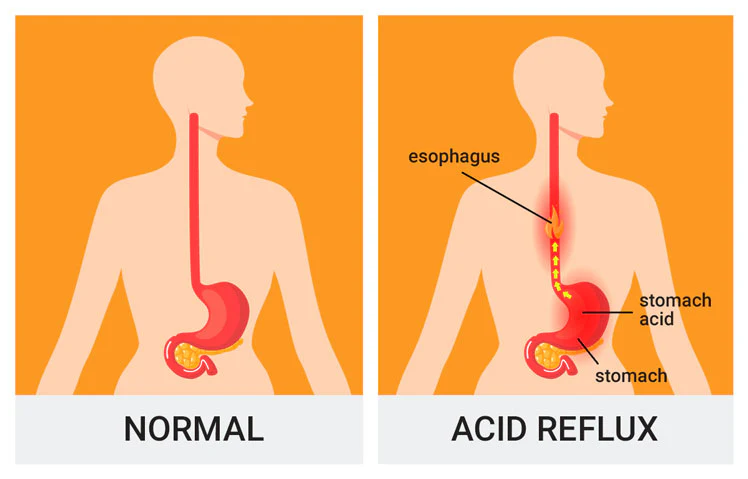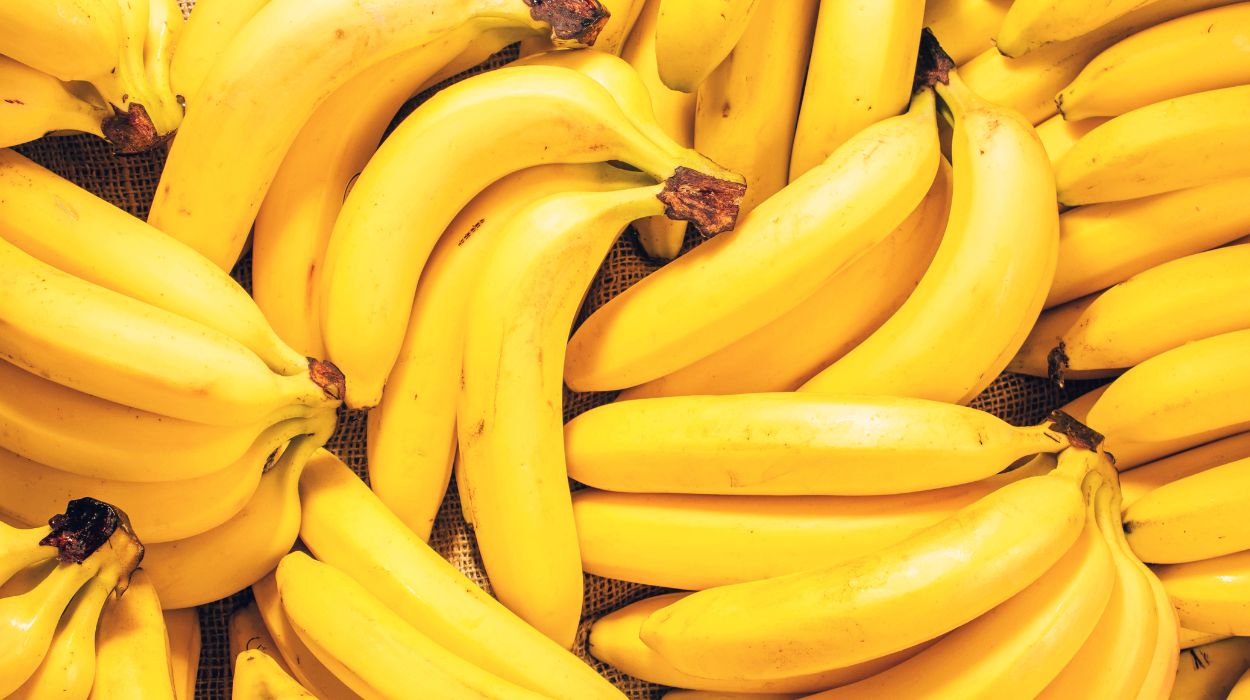Heartburn, that nagging, burning sensation in your chest (short).
An unwelcome visitor can strike after you indulge in your favorite foods, leaving you feeling uncomfortable and frustrated (in pain).
But what if we told you that a seemingly innocent fruit, the banana, might be a surprising culprit behind your heartburn woes? (yay)
In this blog post, we’ll explore the intriguing connection between bananas and heartburn, unraveling the mysteries of this digestive dilemma.
Get ready to discover the truth behind this unexpected link and learn how to enjoy bananas without the burn.
So, let’s dive in and find out why bananas might be giving you heartburn and what you can do about it!
What is Heartburn?

Heartburn, also known as acid reflux, is a common digestive issue many people experience.
It happens when stomach acid flows back into the food pipe (esophagus), causing a burning feeling in the chest, right behind the breastbone.
Here’s how it works: a small muscle called the lower esophageal sphincter (LES) acts like a valve between the esophagus and the stomach.
Sometimes, the LES relaxes or doesn’t close properly, allowing stomach acid to sneak back into the esophagus. This is what causes that uncomfortable burning sensation.
The most common heartburn symptoms are:
- A burning feeling in the chest
- Sore throat
- Chronic cough
- Discomfort in the upper belly
- A sour taste in the mouth
These symptoms often worsen after eating, lying down, or bending over.
Bananas: A Nutritional Powerhouse

| Nutrient | Amount per Medium Banana | Benefits |
|---|---|---|
| Calories | 105 | Provides energy |
| Protein | 1.3g | Supports muscle health |
| Fat | 0.4g | Essential for fat-soluble vitamins |
| Carbohydrates | 27g | Energy source |
| Fiber | 3.1g | Supports digestion and gut health |
| Potassium | 422mg | Regulates blood pressure, heart health |
| Vitamin C | 10.3mg | Boosts immune system |
| Vitamin B6 | 0.4mg | Essential for brain function |
Bananas are a tasty and nutritious fruit that many people enjoy. They’re packed with good stuff like:
– Vitamins (especially vitamin C and B6)
– Minerals (potassium is a big one)
– Dietary fiber
– Natural sugars (fructose, glucose, and sucrose)
When it comes to digestion, bananas can be really helpful.
The fiber in bananas helps keep things moving smoothly in the digestive tract and adds bulk to the digestive content, which improves digestion overall.
Bananas also have resistant starch, which acts like food for the good bacteria in your gut, helping them grow and thrive.
But bananas aren’t just good for digestion; they also have other health benefits.
The potassium in bananas is great for heart health because it helps keep blood pressure levels in check and supports proper heart function.
Bananas, rich in nutrients, support overall digestive health. But their relationship with heartburn is complex. Here’s how bananas might cause this common digestive issue.
The Link Between Bananas and Heartburn
While bananas offer many health benefits, they can sometimes contribute to digestive discomfort, including heartburn, for some people.
1. Acidity of Bananas
Bananas are mildly acidic, with a pH level ranging from 4.5 to 5.2.
While this acidity may not bother everyone, it can trigger heartburn in people with sensitive stomachs or conditions like gastroesophageal reflux disease (GERD).
Research suggests that the acidity levels of different foods can impact digestive health, and those with sensitivities may need to be mindful of their intake.
2. The Role of FODMAPs
FODMAPs, which are Fermentable Oligosaccharides, Disaccharides, Monosaccharides, and Polyols, are types of carbohydrates that can cause digestive issues for some people.
Bananas contain moderate amounts of fructans, a type of FODMAP.
When fructans ferment in the gut, they can produce gas, leading to bloating, pain, and sometimes heartburn.
People with irritable bowel syndrome (IBS) or similar gastrointestinal sensitivities may be more affected by high-FODMAP foods like bananas.
3. Individual Variability
It’s important to remember that everyone’s digestive system is unique and reacts differently to various foods, including bananas.
Some people may experience heartburn after eating bananas, while others have no issues.
Keeping a food diary to track your reactions to bananas and other foods can help you identify patterns and specific triggers.
Suppose you consistently experience heartburn or other digestive symptoms after eating bananas. In that case, consulting with a healthcare professional for personalized advice on managing your diet and symptoms may be helpful.
How Bananas Cause Heartburn
Various factors related to bananas can affect heartburn symptoms, and it’s important to be aware of how your body responds to this fruit.
1. The Ripeness Factor
The ripeness of a banana significantly affects its impact on heartburn. Unripe bananas contain higher levels of resistant starches that may ferment in the stomach, potentially leading to gas and heartburn.
In contrast, these starches convert into simpler sugars as bananas ripen, which are generally easier to digest and less likely to cause discomfort.
However, even the sugars in ripe bananas can pose challenges for individuals with sensitive digestive systems or GERD.
Monitoring how different stages of ripeness affect your symptoms may help manage heartburn more effectively.
2. Bananas in Your Diet
| Food Combination | Benefits |
|---|---|
| Bananas + Oatmeal | Oatmeal is high in fiber and can help with digestion, complementing the low-acid nature of bananas. |
| Bananas + Melons | Melons are alkaline and low in acid, making them a good pairing with bananas for reducing heartburn symptoms. |
| Bananas + Ginger Tea | Ginger has anti-inflammatory properties that can soothe the digestive system, making it a beneficial combination with bananas. |
| Bananas + Whole Grains | Whole grains like brown rice are high in fiber, aiding in digestion and complementing the nutrients in bananas. |
| Bananas + Green Vegetables | Green vegetables like spinach and broccoli are alkaline and can help balance stomach acid when paired with bananas. |
It’s important to consider how bananas fit into your overall diet. A balanced diet is crucial for managing heartburn, and the foods you eat alongside bananas can make a difference.
For example, pairing bananas with alkaline foods like yogurt might help balance stomach acidity and reduce heartburn symptoms.
On the other hand, eating bananas with acidic or spicy foods could worsen heartburn for some people.
3. Other Potential Triggers
While bananas can contribute to heartburn, they’re not the only potential trigger. Other common culprits include:
– Acidic foods (like citrus fruits or tomatoes)
– Spicy foods
– High-fat foods
Comparatively, bananas’ mild acidity and fiber content might offer a safer alternative for some individuals, though they still pose risks for those particularly sensitive to FODMAPs
Keeping track of your reactions to these foods and bananas can help you identify your triggers.
Strategies like keeping a food diary or trying an elimination diet can be useful for pinpointing which foods affect your heartburn.
4. Finding What Works for You
Understanding how bananas and other foods impact your heartburn is key to managing your symptoms effectively.
Considering factors like ripeness, overall diet, and potential triggers, you can make informed choices about including bananas in your meals and snacks.
Pay attention to your body’s responses and adjust your banana intake accordingly.
With a little experimentation and awareness, you can find the right balance that keeps heartburn at bay while still enjoying the nutritional benefits of bananas.
Tips for Preventing Banana-Related Heartburn
The key to enjoying bananas without heartburn is choosing ripe bananas.
As bananas ripen, their acidity decreases, and the levels of certain carbohydrates that can cause fermentation in the gut also go down.
This means that riper bananas are generally less likely to trigger heartburn symptoms.
Here are some more tips to help prevent banana-related heartburn:
1. Watch Your Portions
In addition to choosing riper bananas, pay attention to how much you’re eating.
Smaller portions of bananas may be easier on your digestive system, allowing you to enjoy the fruit’s benefits without discomfort.
2. Pair Bananas with Other Foods
Combining bananas with foods that can neutralize their mild acidity may help reduce the risk of heartburn.
For instance, try eating bananas with oatmeal or other whole grains, which can absorb excess acid.
Nuts like almonds can also add a helpful alkaline boost.
3. Aim for a Balanced Diet
Beyond just bananas, strive for a heartburn-friendly diet overall.
Focus on foods that are low in acid and high in fiber, which can help manage acid reflux symptoms.
Some Good Options Include
– Whole grains
– Green vegetables
– Lean proteins
– Healthy fats
Food Items to Avoid or Limit
– Citrus fruits and juices
– Tomatoes and tomato-based products
– Spicy foods
– Fatty or fried foods
4. Make Lifestyle Changes
In addition to dietary adjustments, certain lifestyle changes can also help prevent heartburn.
Try not to lie down right after eating, as this can allow stomach acid to flow back up into the esophagus more easily.
Maintaining a healthy weight can also reduce pressure on the stomach and lower the risk of acid reflux.
By choosing ripe bananas, managing portion sizes, pairing bananas with heartburn-friendly foods, and making overall dietary and lifestyle adjustments, you can minimize the risk of banana-related heartburn and enjoy this nutritious fruit as part of a balanced diet.
Conclusion
While bananas are a nutritious and popular fruit, they can sometimes trigger heartburn symptoms in certain individuals.
Understanding the factors that contribute to this link, such as the banana’s ripeness, individual digestive sensitivities, and overall dietary context, can help you make informed choices about including bananas in your diet.
Additionally, making broader lifestyle changes, such as maintaining a healthy weight and avoiding lying down after eating, can further reduce your risk of heartburn.
So, the next time you reach for a banana, consider these tips and listen to your body’s unique needs.
With a little mindfulness and experimentation, you can continue to reap the many benefits of this beloved fruit while keeping heartburn at bay.
Choosing ripe bananas, managing portion sizes, and pairing them with heartburn-friendly foods are key steps to enjoying this nutritious fruit without discomfort.
Have you found particular food combinations that help mitigate heartburn? Share your experiences in the comments below or on our social media pages!
Frequently Asked Questions
Can Bananas Cause Heartburn in Everyone?
No, not everyone experiences heartburn after eating bananas. Individual digestive sensitivities and factors like ripeness and portion size can influence this.
Are Ripe or Unripe Bananas Better for Avoiding Heartburn?
Ripe bananas are generally less likely to cause heartburn because they have lower resistant starches and acidity levels than unripe bananas.
How Many Bananas Can I Eat Without Getting Heartburn?
The number of bananas consumed without triggering heartburn varies from person to person. It’s best to start with smaller portions and gradually increase the amount while monitoring your body’s response.
Can I Still Eat Bananas if I Have Acid Reflux or GERD?
People with acid reflux or GERD can often still enjoy bananas as part of a balanced diet. To minimize the risk of symptoms, choose ripe bananas, control portion sizes, and pair them with heartburn-friendly foods.
What Other Foods Should I Avoid if Bananas Give me Heartburn?
If bananas trigger your heartburn, avoid other common heartburn triggers, such as citrus fruits, tomatoes, spicy foods, and fatty or fried foods.
Are There Any Ways to Reduce the Risk of Heartburn When Eating Bananas?
Yes, by choosing ripe bananas, managing portion sizes, pairing bananas with foods that neutralize acidity (like oatmeal or nuts), and avoiding lying down immediately after eating.
Can Lifestyle Changes Help Prevent Banana-Related Heartburn?
Yes, lifestyle changes such as maintaining a healthy weight, avoiding tight clothing, and not lying down right after eating can help prevent heartburn triggered by bananas or other foods.






